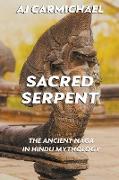- Start
- Sacred Serpent
Sacred Serpent
Angebote / Angebote:
This book frequently returns to the theme of duality, particularly in relation to the serpent and the sun. In addition to signifying danger, dishonesty, and death, the serpent also symbolizes rebirth, transformation, and healing. In a similar vein, the sun represents both harshness and destruction in addition to life, energy, and growth. The investigation of this duality implies that knowledge of these two facets is necessary to comprehend both the natural world and the human predicament. The distinction between mythology and historical truth is becoming increasingly hazy, demonstrating how actual occurrences and cultures have shaped myths and legends and how those have, in turn, influenced them. It is argued that myths are more than just fantastic stories, rather, they have deep roots in societal advancements and human experiences. This emphasizes how crucial mythology is to how we perceive the world and ourselves.
The book explores the symbolic meanings of the sun and serpent in psychology. Based on Carl Jung's theories of archetypes and the collective unconscious it clarifies why these symbols are so universally recognizable and appealing. The symbols are believed to resonate with deeply ingrained psychological concepts and experiences that everyone shares, making them useful tools for reflection and understanding of behavior in others. Numerous studies conducted in a range of cultural contexts highlight the idea that human belief systems are both universal and diverse. The book provides examples of how various societies have integrated and understood the symbols of the sun and the serpent in ways that are particular to their own historical settings and cultural norms. This demonstrates the diversity of human expression in culture and the interdependence of human societies.
It highlights how these symbols have evolved and how they have endured over time. The study looks at how the sun and the serpent have changed over time, adjusting to new social, religious, and cultural norms while maintaining their fundamental symbolic meanings. This theme captures the fluidity of human beliefs and the ongoing conversation that shapes symbols and meanings between the past and present. When taken as a whole, these themes provide a thorough grasp of the breadth and complexity of the investigation into the symbolism of the sun and serpent. A character analysis or a commentary on the writing style and approach employed in the book may come next. An interdisciplinary approach is used in the work, combining psychology, anthropology, history, and mythology. This method enables a nuanced interpretation of the ancient Naga serpent race meaning. To provide a more comprehensive understanding of these symbols, the book draws from a multitude of sources and traditions rather than restricting itself to a single cultural or historical perspective.
Folgt in ca. 10 Arbeitstagen




